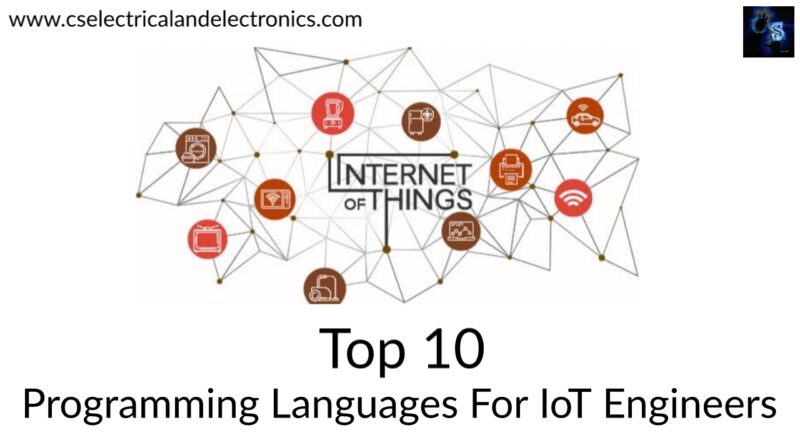Top 10 Programming Languages For IoT Engineers, Internet Of Things
Hello guys, welcome back to my blog. In this article, I will discuss the top 10 programming languages for IoT engineers, programming languages for the internet of things, which language to use for IoT, etc.
If you have any doubts related to electrical, electronics, and computer science, then ask question. You can also catch me @ Instagram – Chetan Shidling.
Also, read:
- Top 10 Applications Of Python Language, Python Applications.
- Top 10 Electrical Vehicle Manufacturers In India, Electric Vehicle Company.
- Top 40 PCB Designing Tools For Engineers, Tools For PCB Designing.
Programming Languages For IoT Engineers
When we talk about the Internet of Things (IoT), we’re talking about a network of physical items that have been embedded with various technologies to connect, interact, and share data via a network. Connectivity, integration, cloud computing, sensing, and other components make up the Internet of Things (IoT), and the technology has a wide range of applications, including Smart IoT devices for homes, health care, automation, and retail.
When it comes to choosing a programming language for IoT development, there are several important elements to consider, including platform and tool compatibility, efficiency, cost of development, and ease of use. Due to its multi-component nature and multiple methods in which the components communicate and interact with one another, the Internet of Things (IoT) is a multilingual space.
End devices, edge computing, data storage, and analytic modules, and end-user applications all play diverse roles and work in diverse ecosystems in an IoT system. The programming languages that IoT developers will employ for coding are determined by their characteristics and requirements.
Here, is the list of programming languages for IoT engineers (Internet of Things):-
10. Rust
The Rust programming language was introduced as a replacement for C. Because of their fine-grained memory management and low runtime overhead, C and C++ are popular programming languages for IoT devices. Rust, on the other hand, is a memory-safe system programming language with low runtime overhead and fine-grained memory management. It is a systems programming language with strong safety guarantees that prevent memory corruption and has the potential to solve problems that can arise while using the C programming language.
09. PHP
PHPoC (PHP on Chip) is a programming language and IoT hardware platform based on the popular PHP programming language. As a result, the language serves as both a Web development language and a general-purpose IoT programming language. The syntax is nearly identical to PHP’s, and it inherits nearly all of PHP’s basic functions. Furthermore, PHPoC introduces new functions for interacting with hardware peripherals such as I/O, UART, I2C, SPI, ADC, TIMER/COUNTER, RTC, and many others.
08. Python
Python, one of the most popular languages among developers, comes in second and third place in the IoT Developers survey 2019 for gateways and edge nodes, as well as for IoT cloud applications. For a variety of reasons, including a big developer community, a huge number of libraries, tools, and much more, this language is suitable for IoT.
07. Parasail
Parasail is a new parallel programming language that enables the creation of fundamentally safe and secure, highly parallel programs that may run on multicore, manycore, heterogeneous, or distributed infrastructures.
Parallel Specification And Implementation Language is the acronym for Parallel Specification And Implementation Language. High-level specification features include parameterized modules with complete separation of interface and implementation, pre and post conditions for individual operations inside a module, invariants that apply to all operations within a module, and much more.
06. LUA
Lua is a general-purpose embedded programming language with data description features that supports procedural programming. It is a general-purpose extension language that is extendable and has rich data description tools. Because this is an embedded language, it can only be used in a host client. Node. Lua, like node.js, is a framework for the “Internet of Things” based on the lightweight Lua interpreter and libuv for event-driven (non-blocking) I/O.
05. JavaScript
All programs that interface with the World Wide Web are effectively owned by JavaScript. This scripting language is utilized for all HTML programs, web apps, and browsers, while not being a formal programming language.
JavaScript appears to share Java’s language libraries and borrows elements from languages like C and Python, yet it is a master unto itself. It is well-known for providing devices with interoperability. Furthermore, its widespread use in modern programming is deserving of mention. Developers who are already familiar with JavaScript will not need to learn a new language to get started with IoT development.
04. Java
Among the most popular programming languages for IoT development, JAVA stands out. The Write Once, Run Anywhere principle, which means that generated JAVA code may run on any platform that supports the language without recompiling it, is one of the most significant properties that make JAVA suitable for the Internet of Things (IoT) development.
In general, JAVA code is compiled to byte code, which may be run on any JAVA Virtual Machine. Furthermore, the object-oriented language enables you to create applications that are interoperable with both Edge nodes and Cloud. Furthermore, the languages include several well-known qualities that are advantageous to IoT development, such as a large built-in library, excellent interoperability, and so on.
03. Go
Golang, or Go programming language, was created by Google and plays an important part in the development of the IoT Platform. This is due to Golang’s built-in concurrency and performance capabilities, which maximize hardware use and make it compatible with IoT devices. This language is compatible for a variety of reasons, including complete hardware utilization, cloud community support, inherent concurrency, compatibility with a variety of other platforms, and so on.
02. C++
The C++ programming language outperforms C in terms of processing power. Because of this, C++ is an excellent pre-processing catalyst for C. C++ boosts C’s processing capacity, making it more capable of running higher-level programming languages.
Although C++ is a complicated language in which developers can make a lot of mistakes, it is still the language of choice for programmers. With its ability to create abstractions and object layers, this programming language demonstrates its strength in Linux projects and the embedded programming arena. C++ also promotes the usage of C#, Python, Java, and a variety of other programming languages.
01. C
In the domain of the Internet of Things (IoT), C is one of the most extensively utilized programming languages. The middle-level programming language enables you to comprehend the fundamental architecture of programming, which offers IoT developers essential flexibility. Furthermore, the language includes several other notable advantages, including portability, a large library, and many others. In addition, the language is nearly compatible with the microcontrollers needed for IoT devices. Due to its not-so-easy syntax and layered design, however, learning C Language successfully takes more effort and time.
C is another popular programming language among programmers. Its appeal stems from the ease with which it can be used. This language, as one of the oldest in modern programming, is perfect for the development of IoT programs, particularly in embedded devices. The IoT boards from Arduino are a nice example.
C is mostly used to write low-level codes for electronic device programming. It’s because of its lightweight processing, and ability to interact directly with RAM.
To sum up, The programming languages for IoT engineers chosen are entirely dependent on the developers’ needs. Each of the top programming languages has its own set of advantages and applications. However, it is certain that for devices, C and C++ will be used for gateways and IoT applications, and Java and Python will be used for cloud applications. The best programming languages for IoT engineers are Python Java, JavaScript, and PHP.
I hope this article “Programming Languages For IoT Engineers” may help you all a lot. Thank you for reading.
Also, read:
- 100 + Electrical Engineering Projects For Students, Engineers
- 100+ C Programming Projects With Source Code, Coding Projects Ideas
- 1000+ Electronics Projects For Engineers, Diploma, MTech Students
- 1000+ Interview Questions On Java, Java Interview Questions, Freshers
- 1000+ MATLAB Simulink Projects For MTech, Engineering Students
- 500+ Embedded System Projects For Engineer, Diploma, MTech, PhD
- 500+ Projects For Diploma Electrical, Electronics Student, Diploma Project
- 8051 Microcontroller Timers, TCON Register, TMOD Register
Author Profile
Latest entries
 All PostsJuly 29, 2021Electric Vehicle Quiz, Top MCQ On Electric Vehicle Most Asked
All PostsJuly 29, 2021Electric Vehicle Quiz, Top MCQ On Electric Vehicle Most Asked All PostsJuly 29, 2021Electronic Components Quiz, Top MCQ On Electronic Components
All PostsJuly 29, 2021Electronic Components Quiz, Top MCQ On Electronic Components All PostsJuly 29, 2021Sub-station Quiz, Top MCQ On Sub-station Most Commonly Asked
All PostsJuly 29, 2021Sub-station Quiz, Top MCQ On Sub-station Most Commonly Asked All PostsJuly 29, 2021Digital Electronics Quiz, Top MCQ On Digital Electronics
All PostsJuly 29, 2021Digital Electronics Quiz, Top MCQ On Digital Electronics








